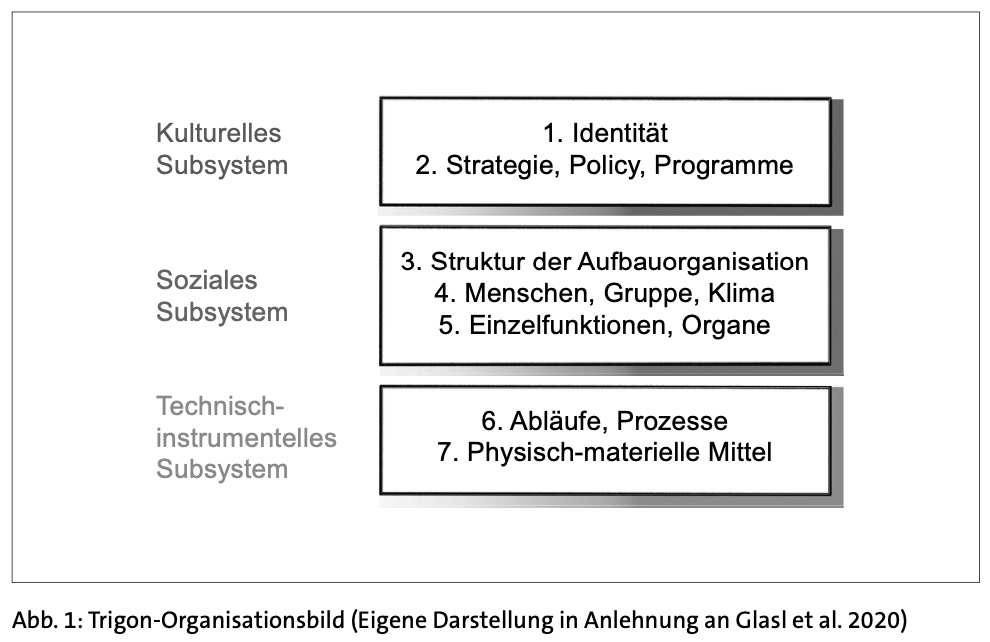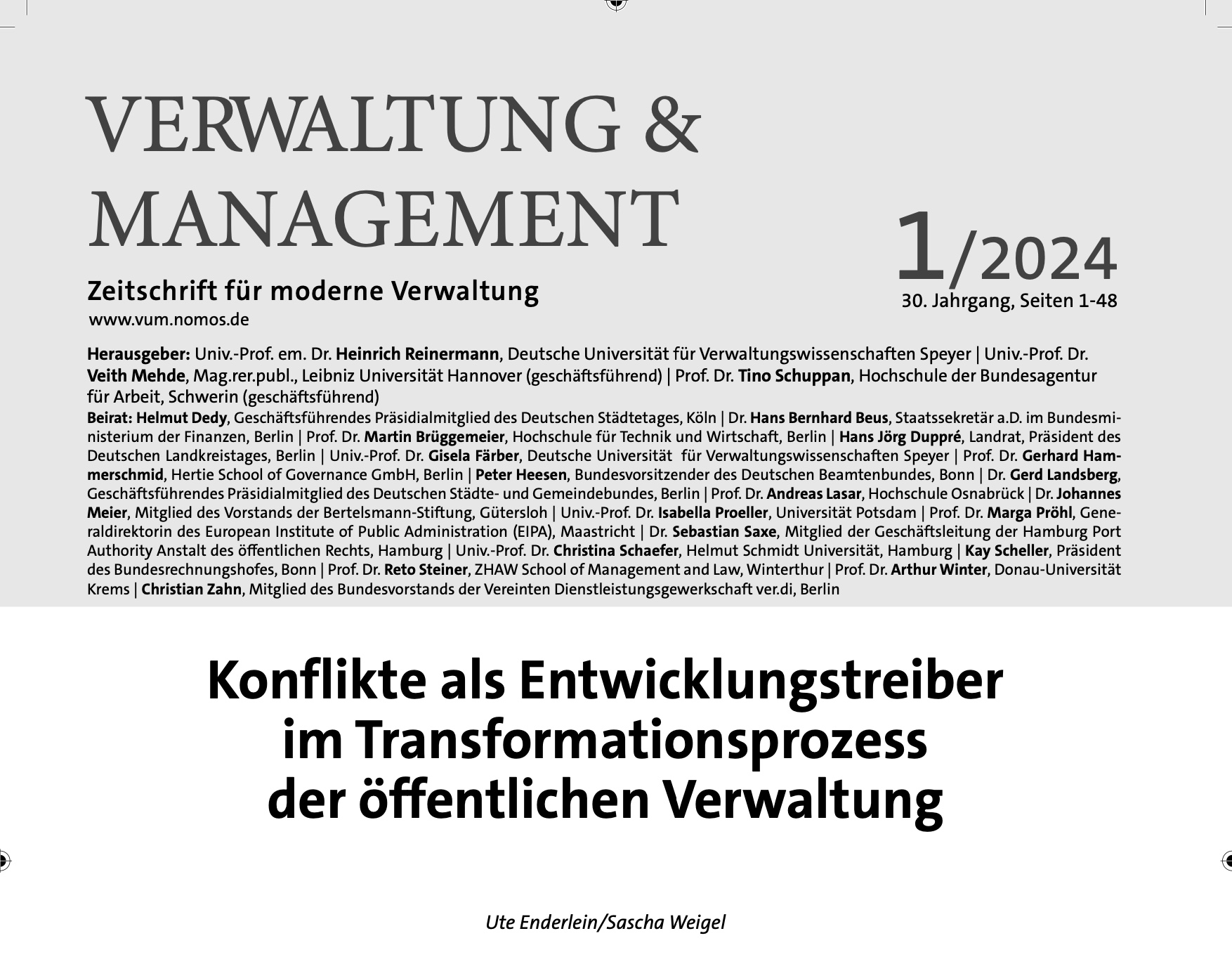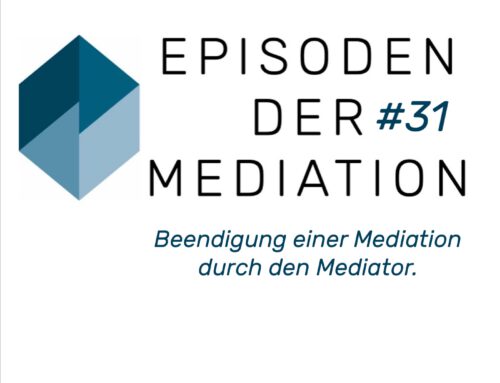Conflicts as drivers of development in the transformation process of public administration
Ute Enderlein & Sascha Weigel
In: Administration & Management 30th Vol. (2024), Issue 1, pp. 3-11
Summary
Transformation processes go with new Conflict potentials and resistance. These can take the form of Learning opportunities and development drivers - if they are approached correctly. The article presents a Model which can be used to systematically examine the potential for conflict in organisations. It will Concrete potential for conflict named with the digital transformation The paper also shows how the organisational learning potential of conflicts can be harnessed.
Extracts
Introduction
(…) Far-reaching transformation processes - and public authorities and public administration organisations are in the midst of these - bring with them new potential for conflict. Jajeśniak-Quast et al. have worked this out in relation to social developments. They show that there is a "…threefold momentum for the occurrence of specific conflicts…" in social transformation processes.
Firstly, there is a swing back and forth between the Opening up to the desired new and old state. This creates an emotional tension between curiosity about the new and the security of the old situation, and thus subjective conflicts of interest. You also have to reckon with the fact that old and new patterns of order work simultaneously. This can lead to differences about which pattern to follow. orientate (path conflicts). Thirdly, transformation processes with radical breaks in the value system, which can lead to specific conflicts of values.
This perspective also applies to the transformation process of public administration towards more agility and people-centred digitalised processes: The back and forth between "old administration" and "new administration" is experienced not only by "administrative rebels", but by all public administration employees. After all, no administrative level or area is exempt from the digital transformation. There are now even new terms for the coexistence of old and new organisational patterns. For example, the "Hybrid file management" that paper files and electronic files are kept at the same time. The clash of old and new values can be observed particularly well where "eternal" values of administrative behaviour, such as hierarchical decision-making, come up against the values of an agile mindset (e.g. inclusion of beneficiaries, iterative solution development).
What can be easily described in theory often unfolds in practice in complex conflict situations between specific people. Especially the Digitisation transformation is accompanied by many conflictual situations at various levels. These conflict situations are not only stressful for those affected, they also cause costs for the organisation, especially if they can escalate unchecked. These costs arise, for example, through Working hours of those involved, which they either need for arguments, reflection or discussing the conflict or because they have internally resigned. Of great relevance, particularly in times of a shortage of skilled labour, are the indirect costs incurred due to sick leave. Long-term absences or cancellations arise. The "escape" approach to conflict resolution is particularly costly for organisations. (…)
"Conflicts can be understood as the clash of different, unagreed solutions to individual problem definitions."


Making conflict potential visible
The Trigon model systematically summarises both the elements of an organisation and the essential core processes of organisations in a model. The model can be used to carry out complex organisational analyses. The analysis tool can also be used to identify potential for conflict in an organisation (ideally with foresight) and either prevent it in good time or - if the potential materialises in actual conflicts - deal with it appropriately and curatively.
In this article, this perspective is applied to the process of digital transformation in public administration in order to systematically examine the potential for conflict that can arise in specific organisations during this process. This is done here from an internal perspective, i.e. the potential for conflict at the interfaces between the administration and its environment (e.g. political system, citizens, companies) is not considered for the time being.
Conclusion
How can conflicts be used as organisational learning opportunities?
- Work towards a constructive conflict culture
- Developing managers' ability to deal with conflict
- Increase psychological safety at team level
- Sensitise project managers in change projects to typical potential conflicts
- Expanding the conflict analysis skills of employees in HR departments
- Increase the organisation's ability to deal with conflict
The current transformation processes in public administration are not only bringing technological innovations with them. In the best case scenario, they also social innovations. This includes new forms of agile collaboration in public authorities and public service organisations. Ideally, this also includes a new Form of participative, shared and transformative leadership. And this includes fundamental structural changes with a (partial) dissolution of the previous silos and more flexible and networked structures.
These innovations in the social sphere will have a significant influence on cultural change in public administration. It should also be considered innovative that Conflicts in these processes as normal and valuable for organisational learning and that it is possible to deal constructively with differences.
This perspective requires a great deal of conviction, as conflicts first and foremost appear personally unpleasant, socially risky and organisationally disruptive. Nobody wants to have conflicts in their organisation. And everyone talks about them - with others. On the one hand, they disrupt the planned and synchronised processes - and are themselves social processes that run according to certain "laws".
Conflicts communicate their innovation potential in an oblique, difficult-to-understand tone. It is therefore first and foremost important to develop (understanding) competences. Tools from conflict research - such as the analytical approach presented here - can help with this.
Complete bibliography for the essay
- Federal Ministry of the Interior and for Home Affairs (ed.) (2021a): Handbuch für Organisationsuntersuchungen und Personalbedarfsermittlung: 1.1.2 Funktionsorientierung vs. Prozessorientierung, https://www.verwaltung-innovativ.de/ OHB/DE/Organisationshandbuch /1_Einfuehrung/11_Organisation/112_Funktio nVsProzess/funktionvsprozessnode.html, last checked on 04.12.2023.
- Federal Ministry of the Interior and for Home Affairs (ed.) (2021b): Handbuch für Organisationsuntersuchungen und Personalbedarfsermittlung: 2.5 Strukturen, https://www. verwaltung-innovativ.de/OHB/DE/ OrganisationshandbuchNEU/2_ Organisationsmanagement/2_5_Strukturen/ Strukturennode.html, last checked on 04.12.2023.
- Edmondson, A.C. (2020): The anxiety-free organisation: How to create psychological safety in the workplace for more development, learning and innovation, Vahlen.
- Enderlein, U. (2023): Conflict potentials as learning occasions in change processes; in: Härtling, S./Enderlein, U. (eds.): Meißner Hochschulschriften, Vol. 11, pp. 74-91.
- Enderlein, U./Heinrich, C. (2022): Digital transformation: Leading successfully through cultural change; in: Sachsenlandkurier, 33rd vol. no. 5, pp. 189-192.
- Faller, K. (2014): Konfliktfest durch Systemdesign: Ein Handbuch für die Praxis der lernenden Organisation, Stuttgart.
- Glasl, F. (2020): Konfliktmanagement: Ein Handbuch für Führung, Beratung und Mediation, Stuttgart.
- Glasl, F./Kalcher, T./Piber, H. (eds.) (2020): Professional process consulting: The Trigon model of the seven OE basic processes, Stuttgart.
- Institute DGB-Index Good Work (2022): Report 2022: Digital Transformation – Change in work from the perspective of employees, https:// index-gute-arbeit.dgb.de, last checked on 04.12.2023.
- Jajeśniak-Quast, D./Kirchhoff, L./Wilke, R./ Worschech, S. (2022): Wandel, Ambivalenz und Resilienz: Zusammendenken von Transformation und Konfliktforschung im Lichte der Fallstudie Frankfurt (Oder)/Słubice; in: Conflict Dynamics, Volume 11, Issue 2, pp. 82-96.
- Kreyenberg, J. (2005): Handbuch Konfliktmanagement: Konfliktdiagnose, -definition und -analyse, Berlin.
- McKinsey & Company (2023): Action, please! How the public sector can overcome the shortage of digital specialists, https:// www.mckinsey.de/news/presse/2023-01-25-it- talent-im-public-sector, last checked on 04.12.2023.
- Project Administrative Rebel Lab (ed.) (2022): Survival-Guide für Verwaltungsrebell:innen …und solche, die es wollen, https://verwaltungsrebellen.de/survival-guide/, last checked on 04.12.2023.
- PwC/EUV (ed.) (2016): Konfliktmanagement in der deutschen Wirtschaft - Entwicklungen eines Jahrzehnts: Eine Kooperationsstudie der PricewaterhouseCoopers AG Wirtschaftsprüfungsgesellschaft und der Europa-Universität
- Viadrina Frankfurt (Oder), https://www.ikm.eu- ropa-uni.de/en/publikationen/PwC_EUV_KMS- Studie-V_161014_final.pdf, last checked on 04.12.2023.
- Rüb, S./Carls, K./Kuhlmann, M./Vogel, B./ Winter, S. (2021): Digitalisierungskonflikte: Eine empirische Studie zu interessenpolitischen Auseinandersetzungen und Aushandlungen betrieblicher Digitalisierungsprozesse, Study of the Hans Böckler Foundation, Vol. 464, https:// www.boeckler.de/de/faust-detail.htm?sync_ id=HBS-008200, last checked on 04.12.2023.
- Saxon State Chancellery (ed.) (2020): Results report of the commission to determine future personnel requirements (Personnel Commission II), https://www.staatsregierung.sachsen.de/download/staatsregierung/ergebnisbericht-personalkommission.pdf, last checked on 4 December 2023.
- Schmeling, J./Bruns, L. (2020): Competences, perspectives and learning methods in the digitalised public sector: Qualifica Digitalis - Metastudy, https://qualifica-digitalis.de/wpcontent/uploads/QD_Metastudie_20201005_ barrierefrei_v5.pdf, last checked on 04.12.2023.
- Stutzenberger, S. (2021): The opportunities of innovation labs for the administration; in: innovative Verwaltung, 10/2021, pp. 24-27.
- Weigel, S. (2021): Organisational ambidexterity and organisational mediation; in: Conflict Dynamics, Volume 10, Issue 3, pp. 211-218.






Leave A Comment